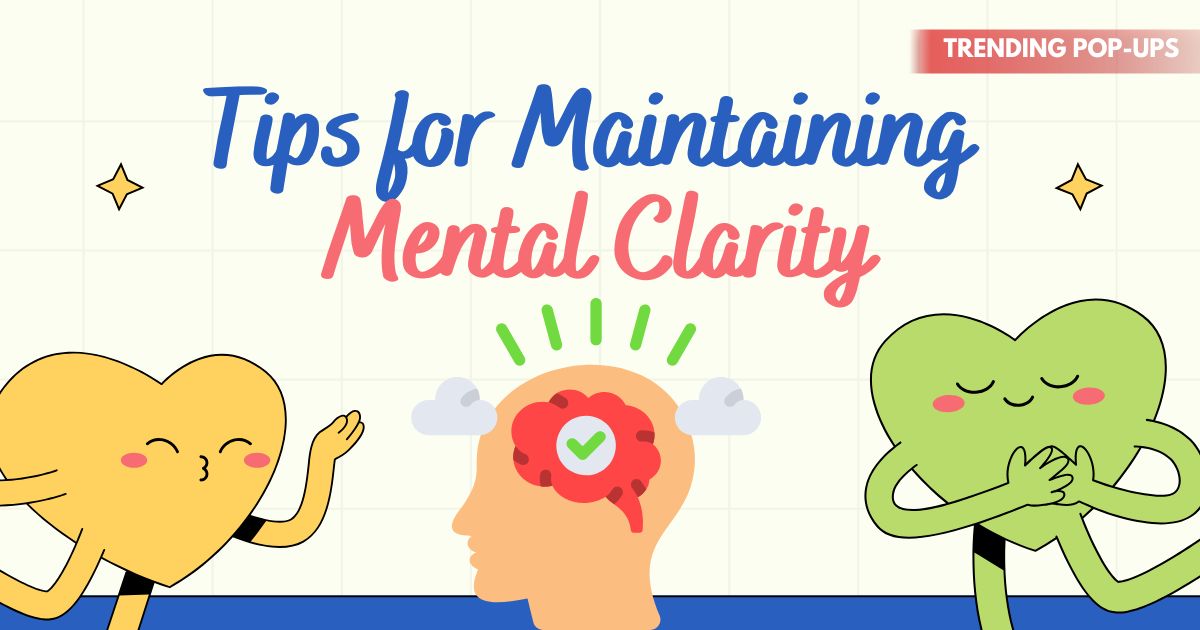In today’s fast-paced digital world, distractions are constant, and stress levels are at an all-time high. Many people struggle with brain fog, poor concentration, and decision fatigue, which can affect both personal and professional life. The good news is that by making intentional lifestyle changes, you can sharpen your focus and maintain mental clarity.
This article explores practical tips for maintaining mental clarity, supported by science and mindful practices that keep the mind sharp, calm, and energized.
Why Mental Clarity Matters
Mental clarity is the ability to think clearly, stay focused, and make decisions with confidence. When your mind is cluttered or distracted, you may experience:
-
Forgetfulness or memory lapses
-
Difficulty concentrating
-
Increased stress and anxiety
-
Reduced productivity
-
Poor decision-making
Maintaining mental clarity not only boosts performance but also improves emotional well-being and overall quality of life.
Tips for Maintaining Mental Clarity
1. Get Sufficient Quality Sleep
Sleep is essential for brain function. A good night’s rest consolidates memory, restores energy, and clears out toxins from the brain. Aim for 7–9 hours of sleep each night and maintain a consistent sleep schedule.
2. Eat a Brain-Healthy Diet
Food directly impacts cognitive performance. Include:
-
Omega-3 rich foods like salmon and walnuts
-
Antioxidant-rich fruits and vegetables
-
Whole grains for steady energy
-
Hydration with plenty of water
Avoid excessive sugar and processed foods, which can contribute to brain fog.
3. Manage Stress Effectively
Chronic stress clouds thinking and reduces concentration. Incorporate stress management practices such as:
-
Deep breathing exercises
-
Spending time in nature
-
Practicing mindfulness daily
4. Exercise Regularly
Physical activity increases blood flow to the brain and enhances the release of endorphins, improving mood and focus. Even a 20–30 minute walk can significantly boost mental clarity.
5. Limit Digital Distractions
Constant notifications and screen time can overwhelm the brain. Try:
-
Using focus apps or the Pomodoro technique
-
Setting screen-free hours
-
Turning off unnecessary notifications
-
Practicing digital detox routines weekly
6. Stay Organized
Mental clutter often comes from physical disorganization. Keep your workspace clean and use tools like planners, calendars, or task management apps to stay on track.
7. Practice Mindfulness and Meditation
Mindfulness helps anchor the mind in the present moment, reducing overthinking and improving clarity. Just 10 minutes of meditation daily can reduce stress and sharpen focus.
8. Keep Learning and Challenging the Brain
Engaging in mentally stimulating activities improves brain flexibility. Read books, solve puzzles, learn a new skill, or take up a hobby to keep your brain active.
9. Take Breaks and Rest the Mind
Working for long hours without breaks leads to fatigue and brain fog. Use techniques like the Pomodoro method (25 minutes of work followed by a 5-minute break) to refresh your focus.
10. Build Strong Social Connections
Conversations and relationships stimulate cognitive processes and improve emotional health. Healthy social interactions reduce stress and keep the mind sharp.
11. Avoid Overloading Your Mind
Multitasking reduces efficiency and clarity. Focus on one task at a time, delegate when possible, and prioritize important tasks first.
12. Seek Professional Help if Needed
Persistent brain fog, memory issues, or difficulty concentrating may indicate underlying conditions like anxiety, depression, or vitamin deficiencies. Don’t hesitate to consult a healthcare professional.
Also Read : Tips for Healthy Aging – Nutrition, Lifestyle & Habits for Longevity
Frequently Asked Questions (FAQs)
1. What foods help with mental clarity?
Foods rich in omega-3s, antioxidants, whole grains, and leafy greens support brain function and enhance clarity.
2. Can lack of sleep affect mental clarity?
Yes. Poor sleep disrupts memory, focus, and decision-making, making mental clarity harder to maintain.
3. How does exercise improve mental clarity?
Exercise boosts blood flow and oxygen to the brain, releasing endorphins that improve mood and cognitive function.
4. Is meditation effective for mental clarity?
Absolutely. Regular meditation reduces stress, improves focus, and enhances present-moment awareness.
5. How do I reduce digital distractions for better focus?
Set screen-free times, use productivity apps, and practice digital detox habits to minimize distractions.



